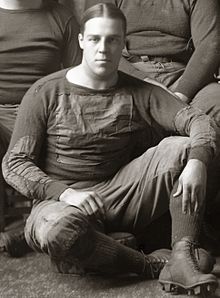Cedric C. Smith
| Cedric C. Smith | |
|---|---|

Cedric "Pat" Smith cropped from 1916 Michigan football team photograph
|
|
| Born | March 12, 1895 |
| Died | April 23, 1969 (aged 74) |
| Citizenship | United States |
| Alma mater | University of Michigan |
| Known for | All-American, 1917 |
| Height | 6', 0" |
| Weight | 198 lb (90 kg) |
Cedric Crawford "Pat" Smith (March 12, 1895 – April 23, 1969) was an American football fullback who played for the University of Michigan (1915–1916), the Great Lakes Naval Training Station, and the Buffalo All-Americans (1920–1921, 1923). He was either the second or third leading scorer in the inaugural season of the National Football League (NFL), then known as the American Professional Football Association (APFA).
Born in Minneapolis, Minnesota, Smith moved with his family to Bay City, Michigan, where he attended high school.
In 1914, Smith enrolled at the University of Michigan and played on the Michigan Wolverines freshman football team. Smith was a standout on the freshman team, being compared with Michigan State star George "Carp" Julian: "Smith weighs 190. He rips up the line in about the same manner as the Aggie terror." As a sophomore in 1915, Smith started five games at fullback. As a junior in 1916, he started seven games at fullback. Michigan's legendary coach, Fielding H. Yost, said of Smith: "Pat was a brilliant player ... fast, brainy and an excellent punter and passer. I would call him an all-around star. He was unfortunate in being injured on a number of occasions, but the following Saturday he was usually ready to put on another stellar performance." After the 1916 season, Smith's teammates selected him as captain of the 1917 Michigan football team.
Smith was also a member of the Michigan track and field team in 1916, 1917 and 1919. He won the Big Ten Conference shot put title in 1919.
After submarines sank seven U.S. merchant ships and the publication of the Zimmermann Telegram, the United States declared war on Germany on April 6, 1917. Even before the formal declaration of war, Smith enlisted with the Ann Arbor naval reserves and by the end of April 1917, he was reported to be "somewhere in the east" serving his country. In honor of Captain Smith's actions, the Michigan football team voted to preserve his status as captain of the 1917 team, even though he spent the fall at the Great Lakes Naval Training Station. For the first time in the history of football at Michigan, the team had no active captain.
...
Wikipedia
